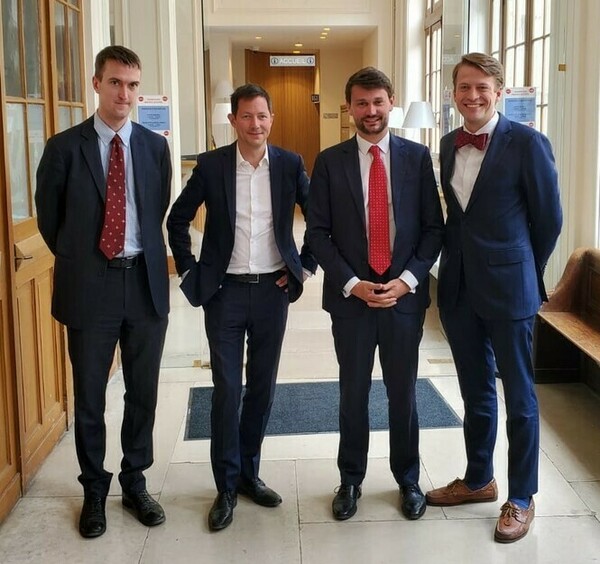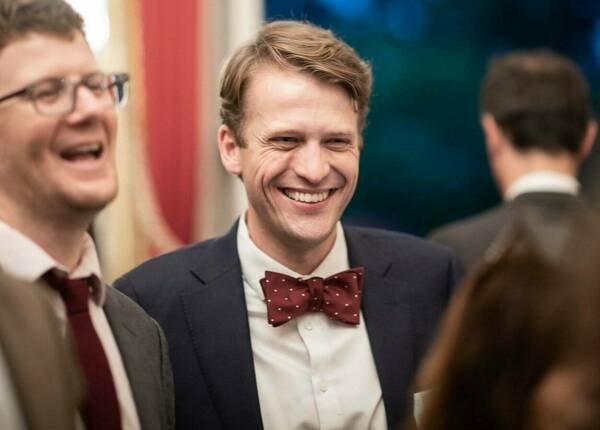This past summer, CCCG Post-Doctoral Research Scholar Luke Foster co-hosted Academia Tocqueville, a ten-day seminar in Paris, France studying French political thought at the cultural, historical, religious, and intellectual levels. The Center for Citizenship and Constitutional Government sponsored the program, together with the Morningside Institute, the Abigail Adams Institute, and the Institute for Human Ecology at the Catholic University of America.
Notre Dame Constitutional Studies PhD candidates Jack Bevacqua, Edward Campbell, and Tyler Castle participated in the program, as well as undergraduate Tocqueville Fellow Luke Thompson.

Foster began planning the seminar in 2020 along with co-hosts Laurent Frémont and Nathan Pinkoski while he was a Visiting Fellow at Sciences Po in Paris. He had met Frémont at the Notre Dame DeNicola Center Fall Conference in 2017. While in Paris, Foster said they began “brainstorming ways to give other Americans exposure to the rich ideas of the French conservative tradition.”
Frémont teaches history of political thought at the Institut d’Etudes Catholiques de Paris and constitutional law at the Institut d’Études Politiques de Paris. Pinkoski is an Assistant Professor at the Hamilton Center for Classical and Civic Education at the University of Florida.
While serving in the French Embassy in the United States Frémont noticed that American Catholics often showed an interest in French political thought, but lacked opportunities to study it beyond the revolutionary and radical thinkers like Rousseau and Sartre. He dreamed of a seminar that allowed these students to dive into conservative French intellectual tradition without isolating culture, history, and religion from politics.
Academia Tocqueville is named for Alexis de Tocqueville, French aristocrat, political philosopher, and statesman of the 19th century—and a justly famed visitor to the United States to write his Democracy in America. On the choice of name, Foster explained “[Tocqueville], more than anybody has articulated the structural virtues and vices of democracy.” The goal of the program being the exchange of ideas across the Atlantic, Foster said Tocqueville “embodies French and Americans learning from each other.”
“Most deeply,” Foster said, “Tocqueville recognizes both that human action is shaped by custom and history, and that man is a free being. He thus symbolizes the approach we take in this seminar: addressing the problem of authority in the post-revolutionary period in a distinctively modern way.”
Colloquia included masterclasses with Rémi Brague and Chantal Delsol, a lecture with Céline Spector, and a discussion with François-Xavier Bellamy, among others.

Céline Spector, Professor of Philosophy at Sorbonne University, taught a seminar that showed how post-Revolutionary thinkers “were inspired by Montesquieu’s critique of despotism and arguments for rule of law to counter the Revolution’s excesses, creating a distinctive brand of French liberalism that is to the right of French Republicanism.”
Castle said: “In her seminar, Céline Spector offered a profound interpretation of Montesquieu's "break-up" with classical republicanism, helping us to better understand how his emphasis on securing liberty by institutional design—rather than by political virtue—shaped the French and American political traditions.”
“Professor Spector’s talk helpfully traced Montesquieu’s central role in the development of modern political thought. It allowed me to gain a deeper appreciation of his points of departure from and agreement with his ancient predecessors, as well as his later influence on liberal thinkers,” Bevacqua said.
François-Xavier Bellamy is a Member of the European Parliament and the leader of the Les Républicains list for European elections. His seminar “defend[ed] the virtue of hope” despite “fighting an uphill battle in contemporary French politics” Castle said. “It was a helpful reminder that the work of a principled statesman must be fueled by something more transcendent than the certainty—or even possibility—of temporal success,” he said.

“The highlight was definitely six hours of face-to-face time with Rémi Brague, probably the most eminent Catholic thinker in France today,” Foster said. Brague, Emeritus Professor at La Sorbonne Université and Officer of the Légion d’honneur and member of the Institut de France, gave a masterclass on his books Anchors in the Heavens and Curing Mad Truths and spent an evening with the fellows over dinner and drinks.
“Having the opportunity to engage with one of the greatest living philosophers in such an intimate and unstructured setting was truly a once-in-a-lifetime experience,” Bevacqua said.
Building on the success of the first edition, Academia Tocqueville will return as a two-week seminar in Paris in July 2024.
Article contributed by CCCG Writing Fellow Merlot Fogarty.